Blog
Zoho Books | TechRadar
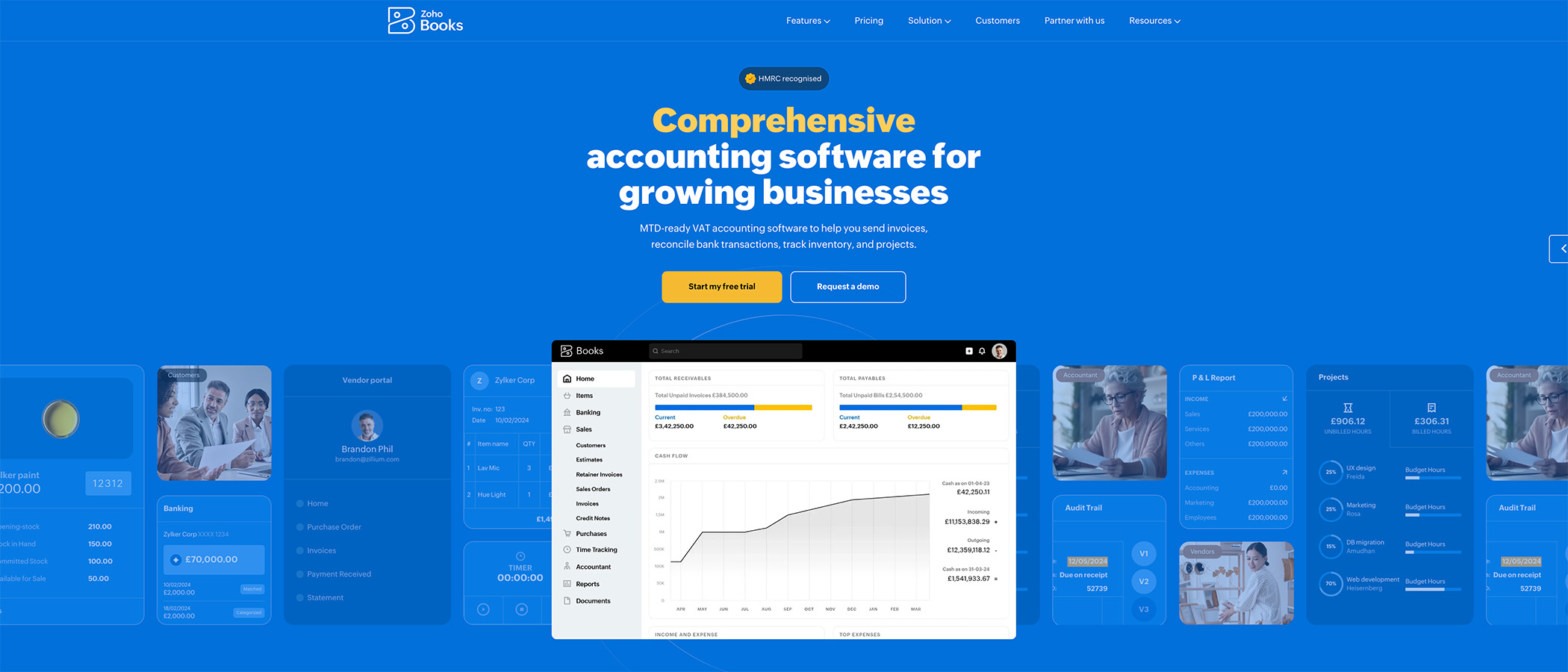
Why you can trust TechRadar
We spend hours testing every product or service we review, so you can be sure you’re buying the best. Find out more about how we test.
Zoho Books is just one small part of a much greater business concern based in India that offers all manner of software for anyone and everyone. With its clean and simple cloud-based interface Zoho Books makes a great cost-effective accounting option if you’re a freelancer, sole trader or someone running a small business.
The benefit with Zoho Books is that it’s also quite scalable, so therefore offers beefier versions for those with larger business concerns, or anyone intent on expanding their operations. While the desktop route is a solid one, Zoho Books also has an impressive app presence, making it a good mobile bet too especially if you’re constantly on the move.
It’s a tax and accountancy software package that sits alongside the likes of competitors FreshBooks, QuickBooks, Xero, Sage Business Cloud Accounting, Kashoo and Kashflow.
Zoho Books: Pricing
Zoho Books has, it explains, a pricing plan for everyone and the service has actually become a little cheaper than it used to be for each of the current packages
It all starts with the Free plan, which includes access for one account holder and another accountant. It, along with the paid plans, has its own restrictions, for example you won’t be able to use more than 1,000 invoices or 1,000 expenses within a year.
Standard costs £12 per organization per month, with space for up to three accounts holders, more invoices and expenses, recurring expenses and invoice generation without Zoho’s branding.
Professional (£24), Premium (£30), Elite (£99) and Ultimate (£199) plans are also available, raising the limits even further and adding in features like multi-currency invoicing, vendor management, purchase orders and stock tracking.
Incidentally, sign up to pay annually rather than monthly and savings can be made on all packages. Zoho does offer additional add-ons, more about which you can glean from its website.
Zoho Books: Features
Zoho Books might be an affordable cloud-based accountancy solution, but that doesn’t make it any less feature-laden. In fact, taking a tour of the package we found that it has a pretty formidable arsenal of tools and options.
That includes invoicing estimating, a client portal, the ability to track expenses, carry out billing, track your banking movements, manage projects and keep an eye on your levels of inventory.
Sales orders, purchase orders, VAT and online payments are all in there too, making Zoho Books fully featured by anyone’s standards. Adding additional value is a solid reporting area, the ability to automate your workflow and, finally, enjoy the convenience of having all your documents stored in one place.
Most importantly for upcoming regulations, all plans can submit MTD-complaint VAT returns directly to HMRC, with MTD compliance also available for Income Tax via quarterly updates and SA103 summary reports.
The reality is that the Free package contains most of the features self-employed individuals are likely to need, so anything included in paid plans is either a bonus or designed for larger companies operating six-figure incomes (or at least high-two-figure turnovers).
Zoho also offers a broad spectrum of integrations, such as with PayPal, Stripe, Shopify, Mailchimp, Office 365, Slack and more, as well as its own comprehensive range of products.
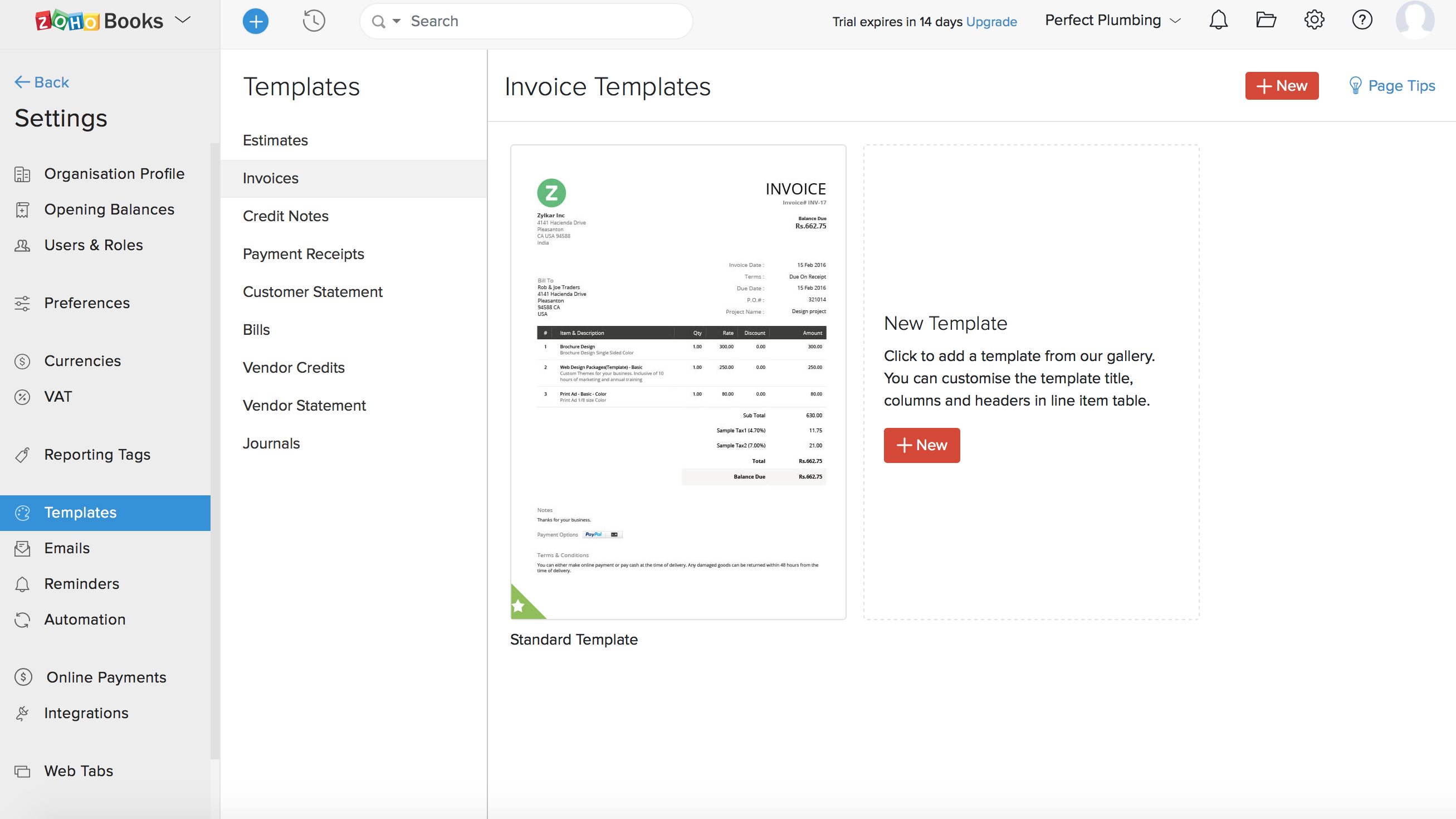
Zoho Books: Performance
During our time using Zoho Books we found the software-as-a-service solution excellent. There are a lot of tabs, menus and other options available and, with a decent internet connection, we could zip around the site without any issues whatsoever.
Connecting to financial institutions, which you’ll want to do to bulk up the appeal of your accountancy package, is fast and efficient.
There’s also the capacity for using any one of many Zoho add-ons to increase the potential of your package. These can be found via the Integrations menu. Performance is further boosted if you choose to dip into the Automation area of the interface, which Zoho Books provides to streamline workflow more efficiently.
Automations can cover recurring expenses, invoices, or bills; convert quotes to invoices; send out payment reminders and trigger workflows to help you keep tabs on your progress, so with the right setup, you can have an extremely powerful ecosystem that does the heavy lifting for you.
In addition, items called Web Tabs add extra usability within the interface if you want to create and use them to access frequently called-upon features and functions.
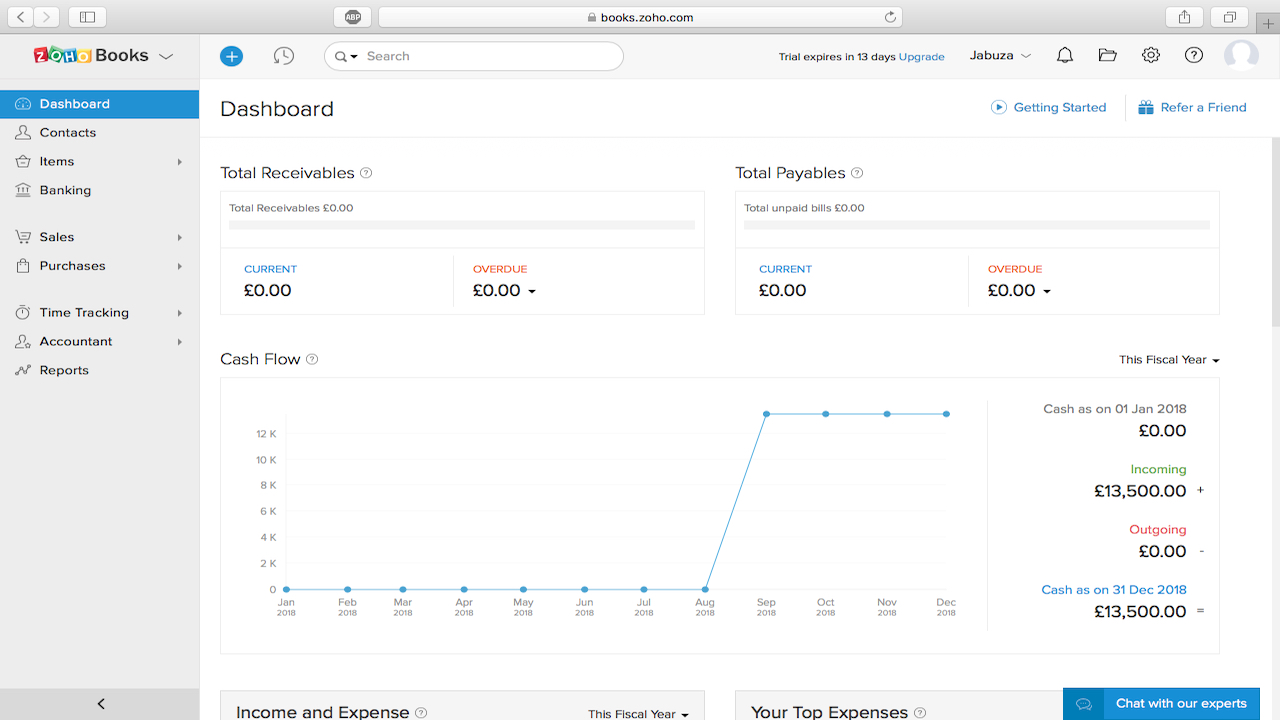
Zoho Books: Ease of use
Setting up Zoho Books could not be simpler. As with all cloud-based services you’ll need to create an account, pick a password and then work your way through the steps. Input your organization’s details, opt in or out of VAT and then pick down through the features checklist. These can be enabled either on or off depending on what suits your needs.
We think Zoho does a sterling job of making what can be a tedious and complex task relatively simple, and that’s largely thanks to its uncluttered user interface and strong explanations.
Usefully, Invoices, Credit Notes, Expenses, Bills, Recurring Invoices and more are available by default in Zoho Books. Press the ‘Get Started’ button and you’ll be read to go. Once you’re inside the dashboard area everything is very self-explanatory, with core menus down the left-hand side and more along the top. Another bonus with Zoho Books is the extensive list of available templates for creating everything from invoices through to customer statements and all points in-between.
The mobile apps score well for usability and functionality, but more importantly they look great which takes some of the stress and dread away for new users who might be struggling to get their head around MTD requirements.
Still, it can sometimes feel a bit disjointed jumping between different apps, portals and websites to access different areas of Zoho’s ecosystem if you’re using more than just Books.
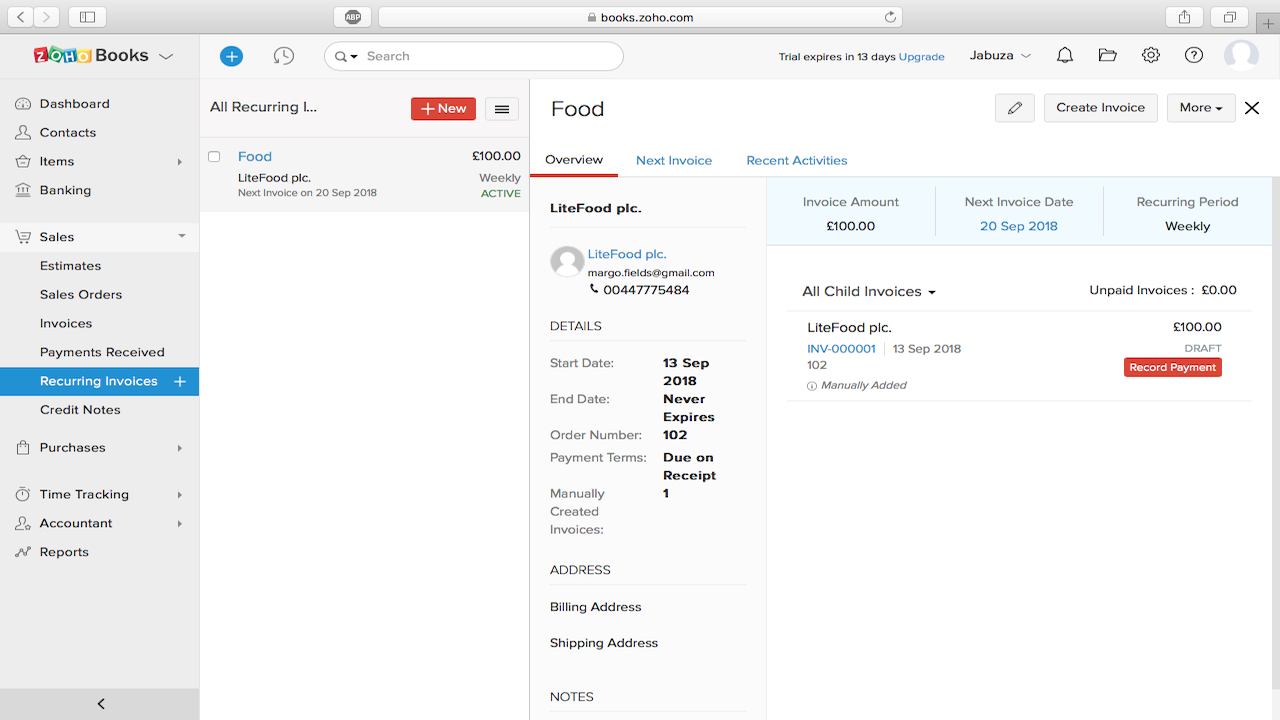
Zoho Books: Support
Zoho Books comes complete with its own free support infrastructure, which arrives via numerous avenues. There’s 24-hour unlimited support 5 days a week and this can be accessed via email, or by using the built-in live chat options. Failing that, Zoho Books issues can be tackled over the phone via a toll free hotline.
Note that free plans only get reduced email support.
We’re also impressed with the beefy selection of supporting options that can be found via the website. There’s help documentation, FAQs, business guides and forums too, which all add extra weight to the overall support structure.
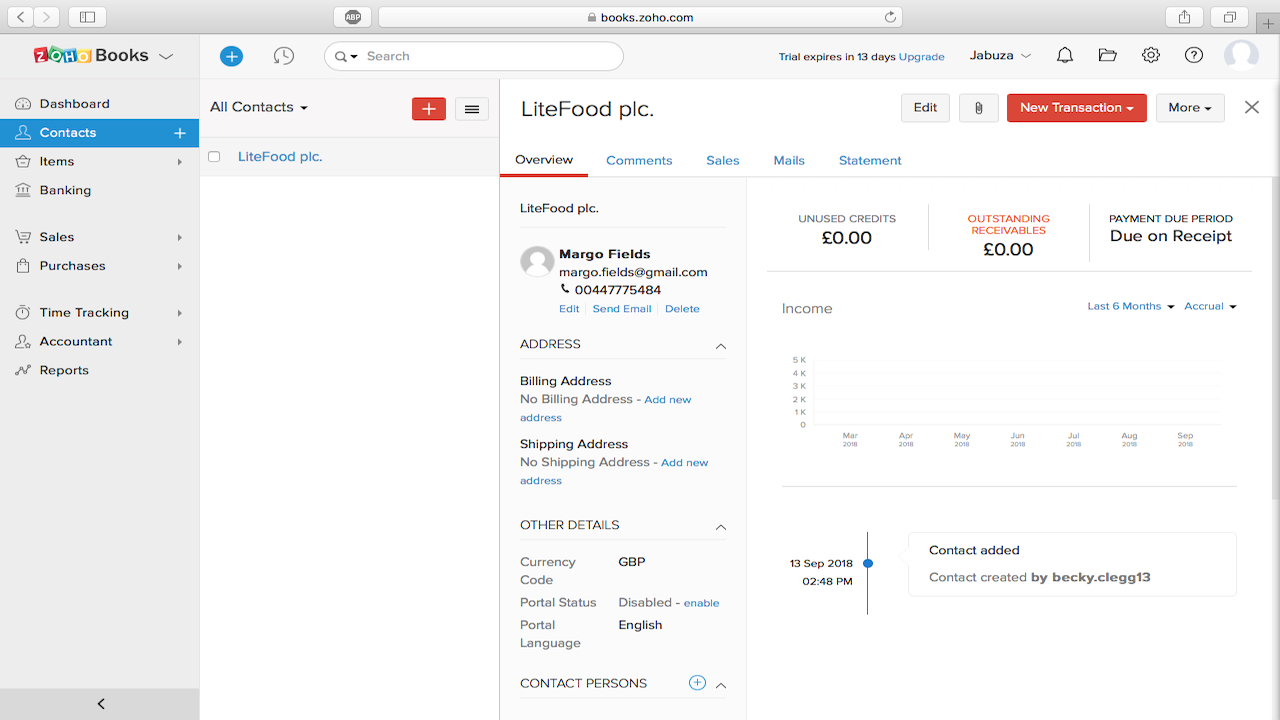
Zoho Books: Final verdict
Zoho Books is a fine pay-as-you-go cloud-based accounting option that provides you with many if not all of the tools you’ll need to keep your business accounts in good shape. While the cloud-based desktop route is a great one to take we’re also really impressed with the level of detail applied to Zoho Books range of apps. These have been nicely put together and deliver everything you need to keep tabs on your accounts on the move.
The ecosystem represents outstanding value for money already, but when you combine it with other apps in Zoho’s ecosystem, you begin to unlock mighty interoperability that could really improve administrative productivity.
We also like the way that Zoho seems more than amenable to helping you scale your accounting package too, with larger users being encouraged to contact the company in order to get a solution more accurately tailored to their needs. However, as it stands in any of the more off-the-shelf guises Zoho Books still has plenty to commend.












